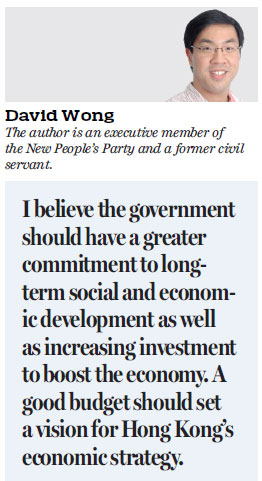Public finance should put more emphasis on promoting equality
Updated: 2017-03-08 07:26
By David Wong(HK Edition)
|
|||||||
The new financial secretary gave his first budget speech on Feb 22. While several new initiatives were announced, including the willingness to study tax reform, the overall tone of the speech remained prudent and conservative. Though this was widely anticipated, I believe the government should have a greater commitment to long-term social and economic development as well as increasing investment to boost the economy. A good budget should set a vision for Hong Kong's economic strategy. Unfortunately, in the past few budgets the government only sought to balance the books with little commitment to investing in the future. I sincerely hope the next administration can revise this conservative, passive habit while using new ideas to better maximize our fiscal reserves and surpluses to invest in the future. We need to create a society with equal opportunities for future generations.

Government revenue has long been constrained by a narrow tax base where most small and medium-sized enterprises do not pay tax, but a small number of employees pay a large portion of income tax. Moreover, a significant part of the general revenue comes from land sales and stamp duties from property and equities transactions. This fluctuates widely every year. Therefore, it is gratifying to see that the government has finally agreed to address the problem of a narrow tax base and unstable government revenue. The Financial Services and the Treasury Bureau will set up a tax policy unit to conduct an in-depth study on tax reform. The goal of tax reform should be to increase the competitiveness of Hong Kong as an international finance and business center. It should also be to ensure that adequate government revenue will be available to cover additional expenditure arising from the aging population and higher public expectations about public services.
The government now possesses over HK$930 billion in fiscal reserves while the surplus for the current fiscal year alone amounts to over HK$92 billion. This demonstrates that the government has ample capacity to do more to satisfy the needs of the community and increase support for the middle class. Other than income tax rebates, the government should actively consider increasing other types of tax allowances to benefit middle-class families that have not yet benefited from the current initiatives.
Government officials have reiterated many times that the current administration has increased spending on healthcare, education and social welfare. Indeed, the expenditure on social welfare has increased by 55 percent since 2012 and the expenditures on healthcare and education have both increased by 23 percent. There is no doubt the government has a strong commitment to improving people's livelihoods. Nonetheless, there is always room for improvement on how to use and distribute these resources to better suit the needs of the public and service users. For example, the ratio between healthcare workers and patients is outdated, so service quality for elderly and disabled people has declined; and support for patients with long-term illnesses has not improved significantly. The reason is that simply throwing money at the problem is not enough. The current practice of providing only lump-sum grants or funding without increases in recurrent public expenditure has affected the quality of public services. There needs to be long-term strategic planning so resources can be targeted to solve specific problems. Furthermore, with huge budget surpluses in the past few years, the government insisted on initiating the "0-1-1" scheme in 2014, where policy bureaus and departments have to reduce their overall expenses by 2 percent in the three years starting from the 2015-16 fiscal year. No doubt that this across-the-board budget cut is not effective and has caused discontent in many sectors. Instead there should be priorities in the allocation of public resources based on the service needs of the community.
The financial secretary mentioned that upholding social justice and sharing the fruits of success is one of the objectives of public finance. A foreign government report stated that current economic inequality manifests itself in three ways: income inequality, wealth inequality and unequal opportunities. It emphasized that economic growth should benefit different sectors in society. When Hong Kong is facing challenges from globalization and the digital revolution, our economic strategy should no longer simply focus on economic growth and fiscal prudence. We need to actively consider how to redistribute some social resources to ensure current and future generations have a better chance of success.
(HK Edition 03/08/2017 page8)